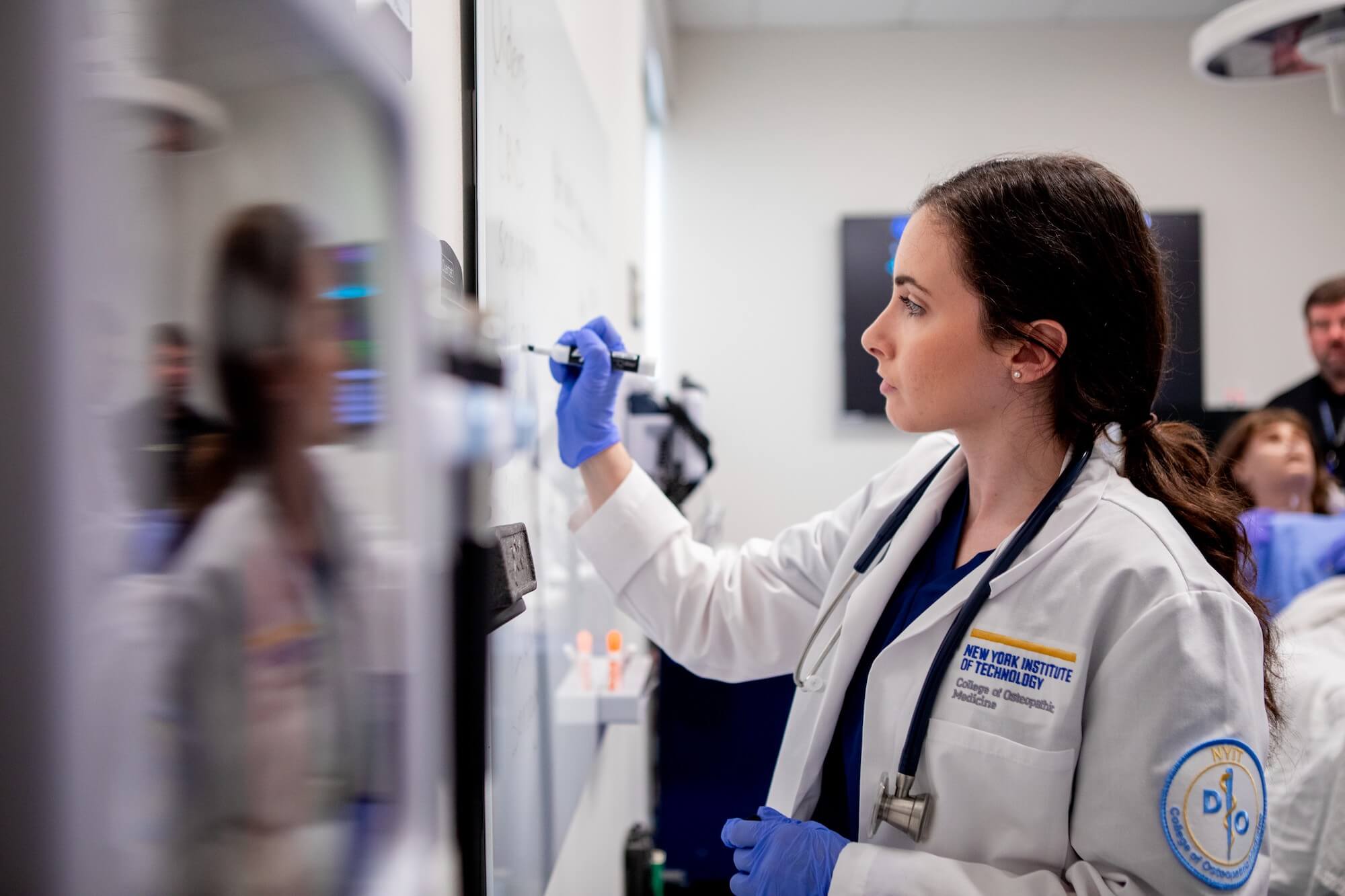
NYITCOM Research Strategic Plan
Goal: Establish, or continue to build, a reputation in the following targeted research areas:
Cancer Biology
Cancer continues to be a significant factor in human health and disease, resulting in significant human morbidity and mortality. The overall objective of the Cancer Biology Research Focus Group is to elucidate mechanisms underlying the initiation and progression of specific cancers with the goal of developing treatments and therapeutics to minimize morbidity and mortality. Researchers are investigating multiple areas of cancer biology in order to provide a better understanding of cancer biology leading to the development of novel cancer therapeutic approaches. One active area of research uses model systems to elucidate the transcriptomic and epigenetic landscapes of pediatric brain tumors in order to develop new therapeutic approaches to target tumor growth without damaging the developing brain. A second active area of research is investigating the role of the DNA damage response and DNA repair pathways in cancer development with a particular focus on targeting the replication stress response and synthetic lethal interactions for cancer therapy.
Cardiovascular Biology
Cardiovascular diseases are a major cause of human mortality and morbidity. Despite extensive research over many years, many fundamental unanswered questions remain. The overall objective of the Cardiovascular Biology Research Focus Group is to elucidate the molecular processes underlying progression to a number of cardiovascular diseases in order to identify novel targets for disease intervention and potential therapeutic approaches. The researchers are investigating a range of topics in cardiovascular pathophysiology including atherosclerosis, arrhythmia, vascular and cardiac remodeling, and heart failure. The researchers employ a range of experimental techniques, spanning from molecular to organismal approaches, to investigate cardiovascular disease processes in both cellular and animal model systems.
Computational Biomechanics and Motor Control
All living creatures possess a body that provides mobility while being constrained by universal physical features. These bodies and behaviors are tightly tuned to local environmental conditions through evolutionary and adaptive processes. The overall objective of the Computational Biomechanics and Motor Control Research Focus Group is to understand the interplay of these factors in order to maximize organismal performance. Researchers study how living bodies, both human and non-human, move and interact with their environment. Our research focuses on both an understanding of the biomechanics of living animals and humans and their evolutionary context. Our laboratories broadly cover topics such as comparative animal motion, locomotor modeling, biofluid-biostructure interactions, and human sensorimotor control.
Degenerative Diseases, Sports Medicine, and OMM
Degenerative diseases and musculoskeletal disorders have a significant impact on quality of life. The overall objective of the Degenerative Diseases, Sports Medicine, and Osteopathic Manipulative Medicine (OMM) Research Focus Group is to minimize the impact of these diseases and disorders in order to maximize patient quality of life. One active area of research is investigation of the effectiveness of OMM and osteopathic manipulative treatment (OMT) to ameliorate disease processes and/or symptoms in a range of diseases and conditions including Parkinson’s disease, pneumonia, and recovery from maximal exercise. A second active area of research is in the developing field of esports. Studies aim to identify injuries produced by prolonged gaming and potential interventions to both improve performance and minimize injuries. A third area of active research focuses on developing innovative treatments to improve quality of life for patients with Parkinson’s disease and Ehlers-Danlos-Syndrome, a rare tissue disorder.
Evolution and Development
Evolutionary and developmental changes are fundamental aspects of the lifeforms on the earth. These processes enable lifeforms, including humans, to adapt to specific environmental factors to maximize organismal survival and success. Despite their fundamental importance, however, the evolutionary and developmental processes underlying these events remain poorly understood. The overall objective of the Evolution and Development Research Focus Group is to answer large-scale evolutionary questions, including ecological shifts across deep time, craniofacial and neurosensory evolution, and developmental mechanisms underlying phenotypic changes. As trained anatomists and paleobiologists, the group employs a suite of classic and modern techniques, including dissection and histology of vertebrate specimens, immunohistochemistry, high-resolution micro-computed tomography (CT) imaging for 3-D tissue reconstructions, a confocal optical profiler to quantify dental microwear and other biological surfaces, and computational biology for phylogenetic and morphometric analyses.
Neurobiology and Sensory Evolution
The neurosciences is an evolving and rapidly expanding area of research. The overall objective of the Neurobiology and Sensory Evolution Research Focus Group is to understand the functioning of the human brain from the molecular to the macroscopic in order to develop therapeutic interventions for nervous system disorders. Researchers are investigating a range of areas including brain development and disease, gene/environment effects on nervous system function, neuron-glia interactions, and brain injury/repair/neuroplasticity. Investigational approaches include in vivo physiology and behavior in humans and animal models, state of the art microscopy, in vitro and cell culture techniques, neural network modeling and simulation, and genomics and proteomics.
Population Health
The Mississippi Delta is home to 9.9 million people across eight states and 252 counties. Although the Delta has many great assets and is steeped in culture and history, the region has experienced some of the country’s most significant social, health and economic challenges. Our faculty work closely with NYITCOM's Delta Population Health Institute to create a culture of health through education, research, policy engagement, and community engagement. Population health research focus areas include community-based participatory research to inform evidence-based practices, environmental health, and health policy.